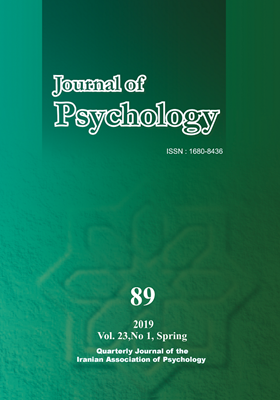-
-
List of Articles
-
Open Access Article
1 - Comparison of Structural Equation Model of Automatic Cognitive Processing and Cognitive Fusion among the Students of Payamenoor University and University of Medical Sciences
Hossein Zare Said Talebi Ahmad Rastegar -
Open Access Article
2 - The Mediating Role of Basic Psychological Needs in the Relationship between Cultural Values (Individualism- Collectivism) and Cognitive Emotion Regulation
Hamideh Mohammadi mahboobeh fooladchang -
Open Access Article
3 - Variety and Acceleration in Trajectory of Emotion Regulation Processes and Strategies for Sadness, Anger, Fear & Pain in Children: A Qualitative Study
Alireza Zarandi shole amiri Hossein Molavi -
Open Access Article
4 - Explaining Academic Burnout on Parent-Child Relationship with Mediating Resiliency and Problem Solving Ability
Khadije Abolmaali Kianoosh Hashemian Aghdas Arabiyan -
Open Access Article
5 - Psychometric Properties of Basic Psychological Needs Satisfaction and Frustration Scale
razieh sheikholeslami Farzaneh Yazdani Zeinabossadat Razavi Estahbanati -
Open Access Article
6 - The Relationship between Personality Traits, Moral Behavior and the Feeling of Guilt with Compulsory Citizenship Behavior
Mohammad Ali Nadi Hajar Azizii Nafiseh Masjedi -
Open Access Article
7 - The Relationship of Work- Family Conflict and Interpersonal Conflict with Psychological Strain and Life Satisfaction
Abdulzahra Naami Maryam Mahmoodikia
-
The rights to this website are owned by the Raimag Press Management System.
Copyright © 2017-2026







